It seems everyone is getting into the “last days craze.” The latest entry is Ken Ham of Answers in Genesis. I’m surprised at this since AiG has stayed away from the topic. I wrote two articles about the importance of eschatology in the same way Ham wrote about the importance of creation (see here and here). I’m a big proponent of showing how the origin of life is impossible no matter how many years are claimed for it—millions, billions, or trillions of years. Biological life did not and cannot spontaneously generate; it’s fundamentally impossible! Even Star Trek’s Project Genesis required existing matter, most likely existing lifeforms, and designers to bring a dead planet to life. This and other related issues make the age of the earth argument irrelevant because abiogenesis and its relationship to non-physical entities like morality, logic, reason, love, compassion, hope, purpose, etc. cannot be accounted for in a matter-only world. My new book Why It Might be OK to Eat Your Neighbor: If Atheism is Right Can Anything be Wrong? deals with this inherent fatal flaw in atheism.

Why it Might Be OK to Eat Your Neighbor
The most damning assessment of a matter-only cosmos devoid of a Creator is that we got to this place in our evolutionary history by acts of violence whereby the strong conquered the weak with no one to support or condemn them. Why It Might Be OK to Eat Your Neighbor repeatedly raises the issue of accounting for the conscience, good and evil, and loving our neighbor. It’s shocking to read what atheists say about a cosmos devoid of meaning and morality.
Buy NowHow is the above related to Ken Ham’s foray into eschatology an issue? He has taken the position that we are living in the last days based on a dispensational interpretation of 2 Peter 3:3: “Knowing this first: that scoffers will come in the last days.” Dispensationalists and some Reformed partial preterists like Ken Gentry assume that we are in the “last days” and the next eschatological event is the burning up of the cosmos. This is an impossible view since the supposed new physical heavens and earth do not come into being until after the thousand years of Revelation 20. See “What Does Peter Mean by the Passing Away of Heaven and Earth? A Study of 2 Peter 3” for a study of the chapter and this topic that few people recognize as a fundamental interpretive problem for futurists.
Ham states the following in his long Facebook post about the last days:
We are in the last days! Ever since God’s Son stepped into history to become Jesus Christ the God-man, we have been in the last days. We don’t know how “last” we are. We just know we are more “last” than we were. We do know that one day Jesus will return and there will be a final judgment—and the last days will then end.
It’s fascinating that nearly 2,000 years ago, Peter (under the inspiration of the Holy Spirit) wrote about scoffers in the last days. As we read about these scoffers, we realize that there is “nothing new under the sun” (Ecclesiastes 1:9). The basic sin nature of man is the same today as it was 2,000 years ago—and as it was 6,000 years ago when our ancestor Adam rebelled against God.
Peter explains that these scoffers in the last days will scorn those who believe Jesus is returning, and will exclaim, “Where is the promise of His coming? For since the fathers fell asleep, all things continue as they were from the beginning of creation.” The philosophy of the scoffers is that physical processes just go on and on without any miraculous intervention (2 Peter 3:4).
He ties his interpretation to the amounting persecution of Christians as evidence that Jesus’ return may be near. But is Peter describing our day? Not at all.
Ham’s view is not new. Brock Hollett in his book Debunking Preterism also appeals to 2 Peter 3 to explain that the mockers Peter mentions is still future. Here’s Hollett’s way of interpreting Peter’s objection to the scoffers of his day:
Peter reminded his readers that scoffers would cast aspersion on the prophetic certainty of the Lord’s promise to return quickly. They will mock, “Where is the promise of his coming?” (2 Peter 3:4). The apostle responded to this charge by explaining that the apparent failure of Jesus to return quickly is not an actual failure to faithfully keep his promises. Furthermore, the fact that he did not return immediately does not indicate a failure to return soon. The apostle affirmed that the Lord “is not slow as some count slowness” (v. 9, emphasis added.)
Ham’s position is similar to Hollett’s. They both line up with Henry Morris’s view in his 1991 book Creation and the Second Coming (132). I don’t have the space to expand on the “flood” analogy only to say that the imagery is picked up in Daniel 9:26 related to the destruction of the temple that took place in AD 70: “And its end will come with a flood; even to the end there will be war [Matt. 24:6]; desolations are determined [23:38].” The “flood” is a reference to the invading armies that destroyed the temple as Jesus had predicted and took away some of the Jews as prisoners of war as described in Matthew 24:37-41:
For the coming of the Son of Man will be just like the days of Noah. For as in those days which were before the flood they were eating and drinking, they were marrying and giving in marriage, until the day that Noah entered the ark, and they did not understand until the flood came and took them all away; so shall the coming of the Son of Man be. Then there shall be two men in the field; one will be taken, and one will be left. Two women will be grinding at the mill; one will be taken, and one will be left.
It was a local judgment. The same is true of how Peter is using the flood analogy. This brings us to identifying the scoffers who were asking, “Where is the promise of His coming?” (2 Peter 3:3). Peter was describing the scoffers of his day who were scoffing at what Jesus had predicted in Matthew 24:34, that He would return in judgment before their generation passed away.
The fact is, the New Testament writers, including Peter (1 Pet. 1:20; 4:7), taught that Jesus would return “shortly” (Rev. 1:1, 3; 22:10), before the last apostle died (John 21:18-24; Matt. 16:27-28), within a generation (Matt. 24:34), because the time was “near” for them (James 5:7-9; Rev. 1:3), and the old covenant was “near to disappear” (Heb. 8:13). The “coming” mentioned by New Testament writers was a “coming” in judgment, not a physical coming like Jesus’ incarnation, but like the predicted comings that resulted in judgments by God as described by Old Testament prophets (e.g., Isa. 19:1; Micah 1:2-4; Zeph. 1:6, 14).
The judgment coming that the New Testament describes was leveled against Israel in the period leading up to the temple’s destruction in AD 70 (Matt. 22:1-14). It was this event that bred a generation of prophetic scoffers because three decades had passed with no change in Israel’s situation. The temple was still standing, stone upon stone (24:2), when the scoffers began to ridicule the earlier prediction made by Jesus. In fact, the rebuilt temple was more beautiful than ever.
The scoffing done by Peter’s skeptics makes sense only if a particular time frame—their generation—was in view. Around AD 30, when Jesus sat upon the Mount of Olives (24:1-3), He prophesied what would happen before their generation passed away (24:34). By the time Peter wrote his letter, that 40-year generation was coming to an end and the temple was still standing. As a result, these scoffers questioned the prediction that “not one stone here will be left upon another” (24:2) and “this generation will not pass away until all these things take place” (24:34). Life in Jerusalem was going on as it had been, just like before the flood. There was no perceived threat to the temple, and the Roman Empire and her army had not made any overtures to do battle with the Jews (Luke 21:10; 19:43), so some people began to ridicule Jesus’ prediction like many liberals do today and thereby question the reliability of Jesus as a prophet and the integrity of the Bible. These were the “false teachers” who were introducing “destructive heresies, even denying the Master who bought them, bringing swift destruction on themselves” (2 Pet. 2:1; cp. 2 Thess. 2:10).
The people Peter accused of being “scoffers” were enemies of Jesus and the gospel and were alive when Peter and Jude wrote their letters. Jude writes:
But you, beloved, ought to remember the words that were spoken beforehand by the apostles of our Lord Jesus Christ, that they were saying to you, “In the last time there will be mockers, following after their own ungodly lusts.” These are [present tense] the ones who cause [present tense] divisions, worldly-minded, devoid of the Spirit (Jude 17-19).
When are/were the “last times”? The writer to the Hebrews defines the phrase for us as “these last days” (Heb. 1:1-2), that is, the days in which he was writing his epistle. Peter confirms this when he notes, “For He was foreknown before the foundation of the world but has appeared in these last times for the sake of you” (1 Pet. 1:20) at what was the “consummation of the ages” (Heb. 9:26). Peter’s “in the last time” (1 Pet. 1:5) and “in these last times” (1:20) are describing the same timeframe.
[God did not] cease till he made a final End and Dissolution of the Jewish Oeconomy [economy], which St. Peter calls the End of all things (I Pet. iv. 7) and St. James, the Coming of the Lord (Jam. v. 8) and which our Saviour calls the Coming of the Son of Man (Mat. xiv. 27, 28) the last of which verses may probably be an Allusion to the Roman Eagle, which was the Ensign of the Roman Empire.[1]
Notice Jude’s use of “now” and the audience reference about the mockers: “these are the ones who cause divisions.” Jude is describing the mockers of his time. Paul had warned the Ephesian church that “savage wolves” would come in among them, “not sparing the flock … speaking perverse things, to draw away the disciples after them” (Acts 20:29-30; cp. Jude 1:4; Gal. 2:4; 2 Tim. 3:6; 2 Pet. 2:1). John mentions Diotrephes who “does not accept what we say” (2 John 9).
There’s a big difference between a “scoffer” who rejects God’s Word outright and someone who argues for an alternative interpretation using sound biblical arguments by interpreting the time words used by the Bible writers as accurate. A person who disagrees with modern-day prophetic speculation is not a “scoffer,” especially when there have been centuries of failed attempts at predicting the certainty of the end.

Identifying the Real Last Days Scoffers
The “coming” mentioned by a number of New Testament writers was a “coming” in judgment, not a physical coming like Jesus’ incarnation, but similar to the predicted comings that resulted in judgments by God as described by Old Testament prophets (e.g., Isa. 19:1; Micah 1:2–4; Zeph. 1). The judgment coming that the New Testament describes was leveled against Israel in the period leading up to the temple’s destruction in A.D. 70 (Matt. 22:1–14). It was this event that bred a generation of prophetic scoffers since nearly four decades had passed with no change in Israel’s situation. The temple was still standing, stone upon stone, when the scoffers began to ridicule the earlier predictions.
Buy NowSecond Peter 3 links “scoffers” (v. 3 in KJV; “mockers” in NASV) with “the last days” (v. 3), “the promise of His coming” (v. 4), the “day of the Lord” (v. 10), and the passing away of the “heavens” and the “earth” (v. 10). As has been pointed out, “last days” is not code for events leading up either to an event called the “rapture of the church” or a future physical coming. Gordon Clark comments:
“The last days,” which so many people think refers to what is still future at the end of this age, clearly means the time of Peter himself. I John 2:18 says it is, in his day, the last hour. Acts 2:17 quoted Joel as predicting the last days as the lifetime of Peter…. Peter obviously means his own time.[2]
There are other passages such as, “as you see the day drawing near” (Heb. 10:25; also 1 John 2:18), “upon whom the ends of the ages have come” (1 Cor. 10:11), and the storing up of their treasure in “the last days” (James 5:3) not “for” the last days. The question is, the last days of what? The last days of the old covenant with its stone temple, blood sacrifices, and earthly sinful human priesthood, the theme of the book of Hebrews.
There isn’t anything new about scoffers. A similar story is found in the Old Testament that is comparable to Jesus’ description of the destruction of Jerusalem that He prophesied in the Olivet Discourse in the Synoptic Gospels and the description of the scoffers of their day mentioned by Peter and Jude:
Furthermore, all the officials of the priests and the people were very unfaithful following all the abominations of the nations; and they defiled the house of the Lord which He had sanctified in Jerusalem. The Lord, the God of their fathers, sent word to them again and again by His messengers, because He had compassion on His people and on His dwelling place; but they continually mocked the messengers of God, despised His words and scoffed at His prophets, until the wrath of the Lord arose against His people, until there was no remedy. Therefore, He brought up against them the king of the Chaldeans who slew their young men with the sword in the house of their sanctuary, and had no compassion on young man or virgin, old man or infirm; He gave them all into his hand. All the articles of the house of God, great and small, and the treasures of the house of the Lord, and the treasures of the king and of his officers, he brought them all to Babylon. Then they burned the house of God and broke down the wall of Jerusalem and burned all its fortified buildings with fire and destroyed all its valuable articles. Those who had escaped from the sword he carried away to Babylon; and they were servants to him and to his sons until the rule of the kingdom of Persia, to fulfill the word of the Lord by the mouth of Jeremiah, until the land had enjoyed its Sabbaths. All the days of its desolation it kept sabbath until seventy years were complete (2 Chron. 36:14-21).
The mockers had called into question the prophecies of the prophets about the soon coming judgment on Judah. Their generation would see it come to pass, not some distant generation. As I mentioned earlier, for a more complete discussion of 2 Peter 3, see “What Does Peter Mean by the Passing Away of Heaven and Earth? A Study of 2 Peter 3.”
[1]John Home, The Scripture History of the Jews, and Their Republick, 2 vols. (London: 1737), 303.
[2]Gordon H. Clark, II Peter: A Short Commentary (Nutley, NJ: Presbyterian and Reformed, 1975), 64.

